Resume
Fellow Doctor Cover Letter Examples

May 29, 2025
|
12 min read
Discover tips for crafting a stellar fellow doctor cover letter with our guide. Nail that first impression and make your credentials stand out. Gain insights on how to diagnose your cover letter’s flaws and cure them with precision.
4.70 Average rating
Rated by 348 people
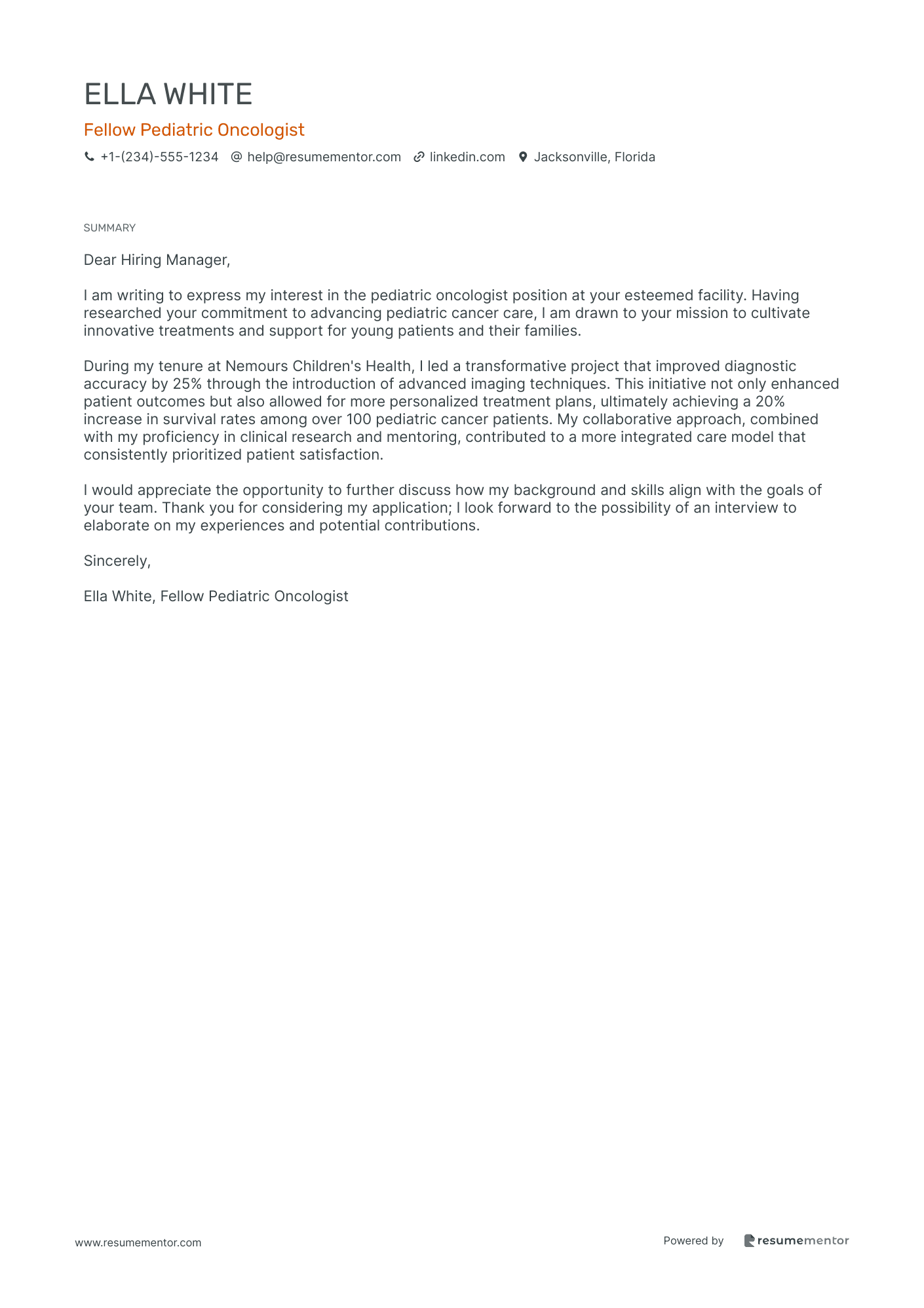
Fellow Pediatric Oncologist
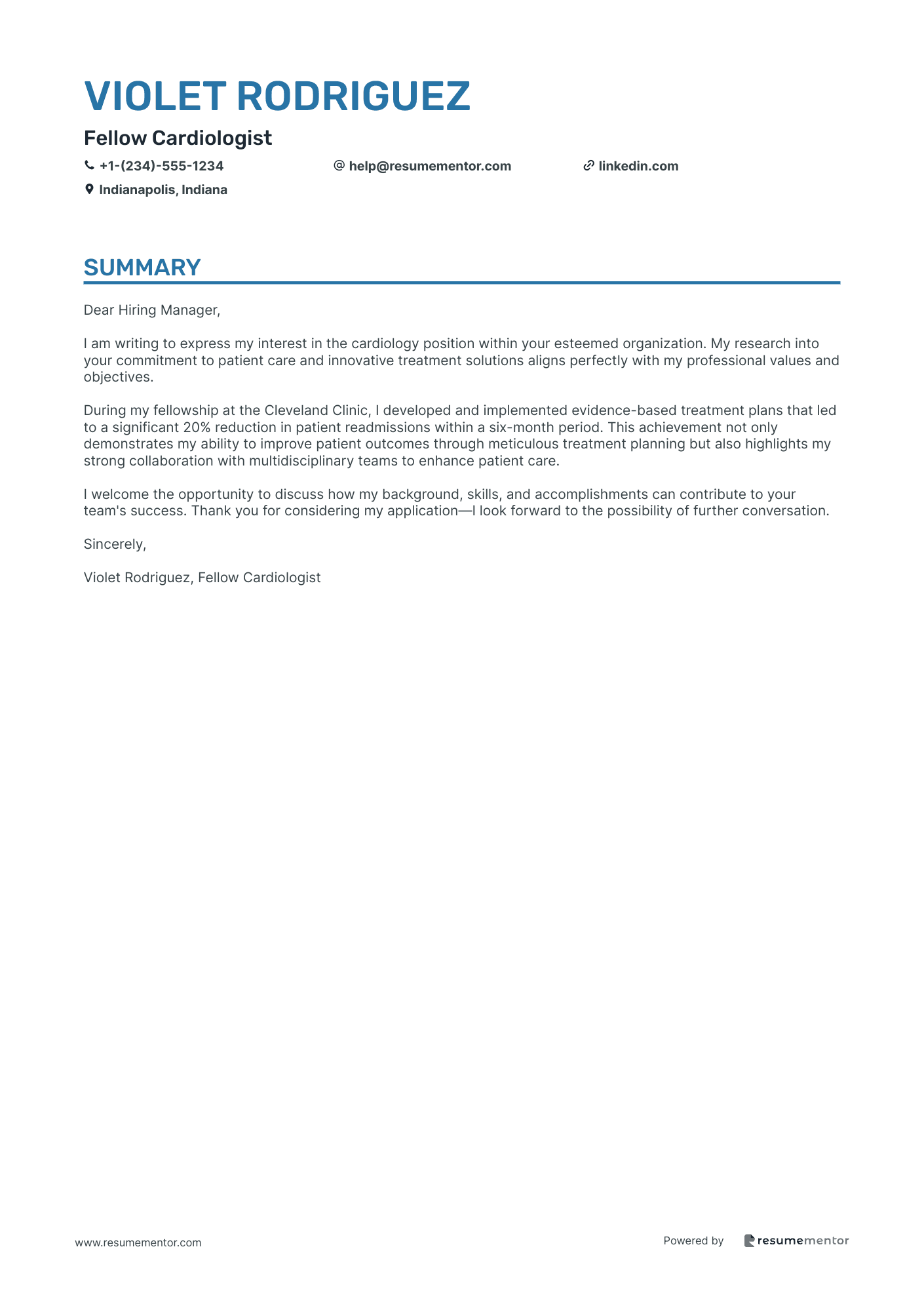
Fellow Cardiologist
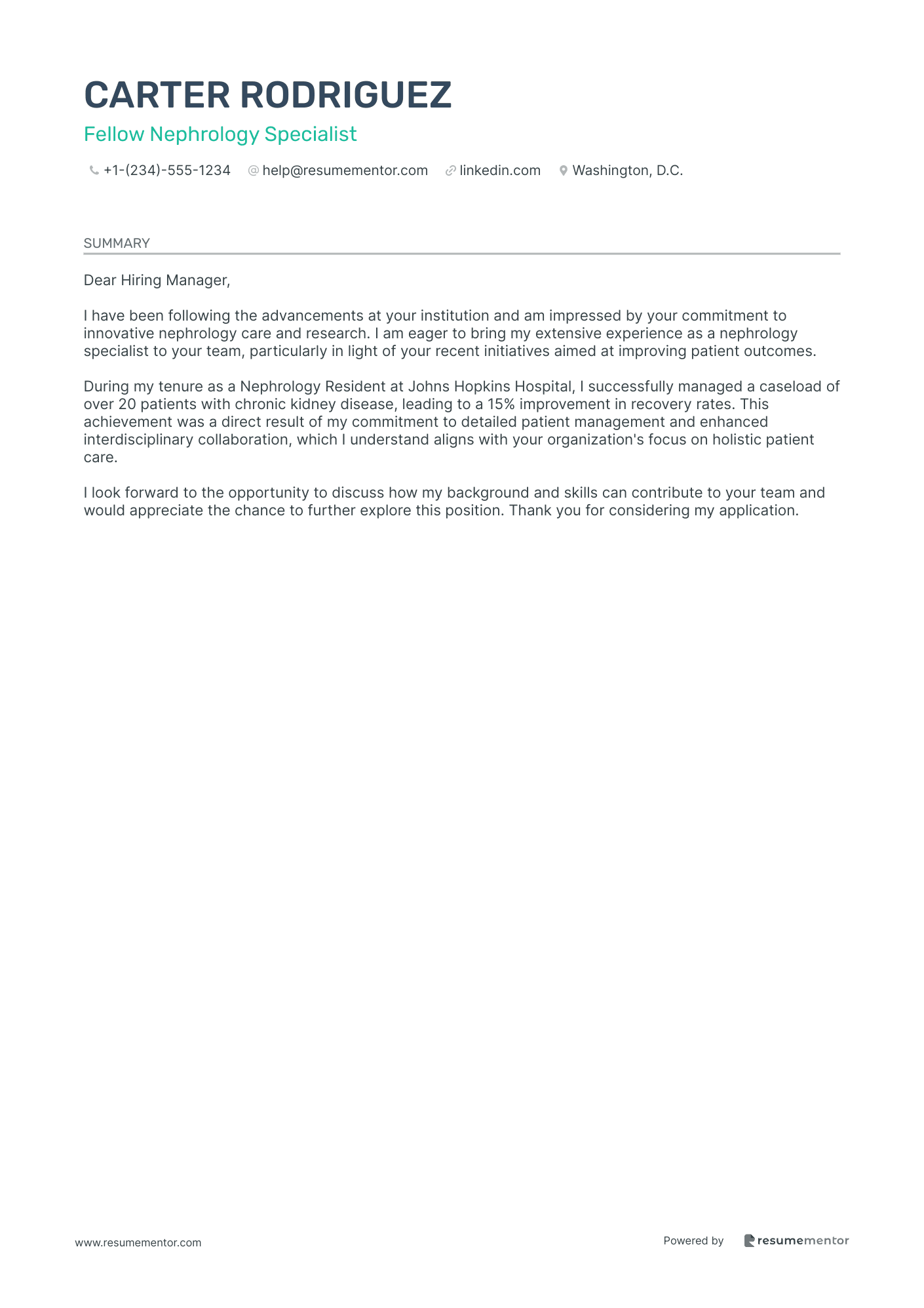
Fellow Nephrology Specialist
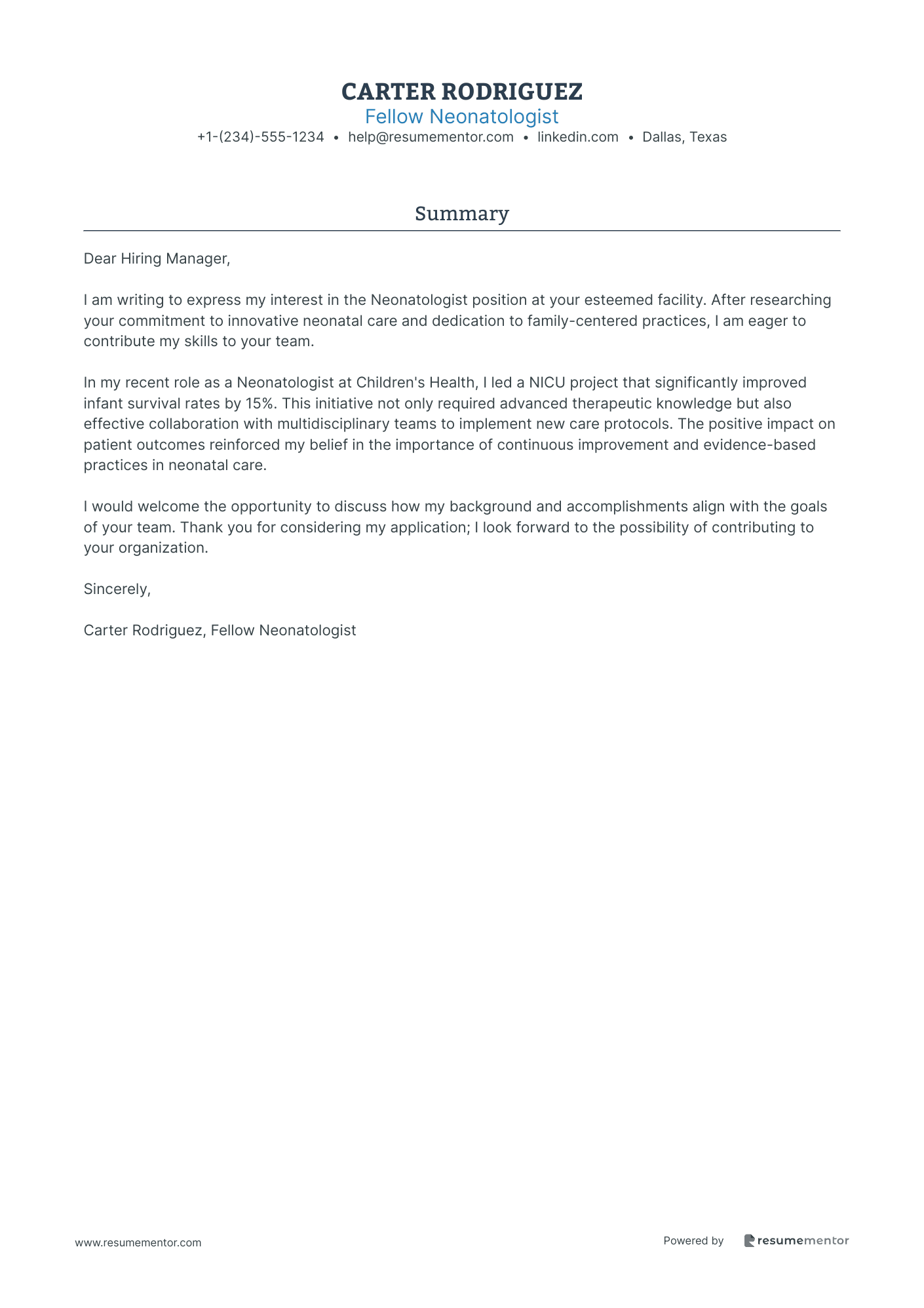
Fellow Neonatologist
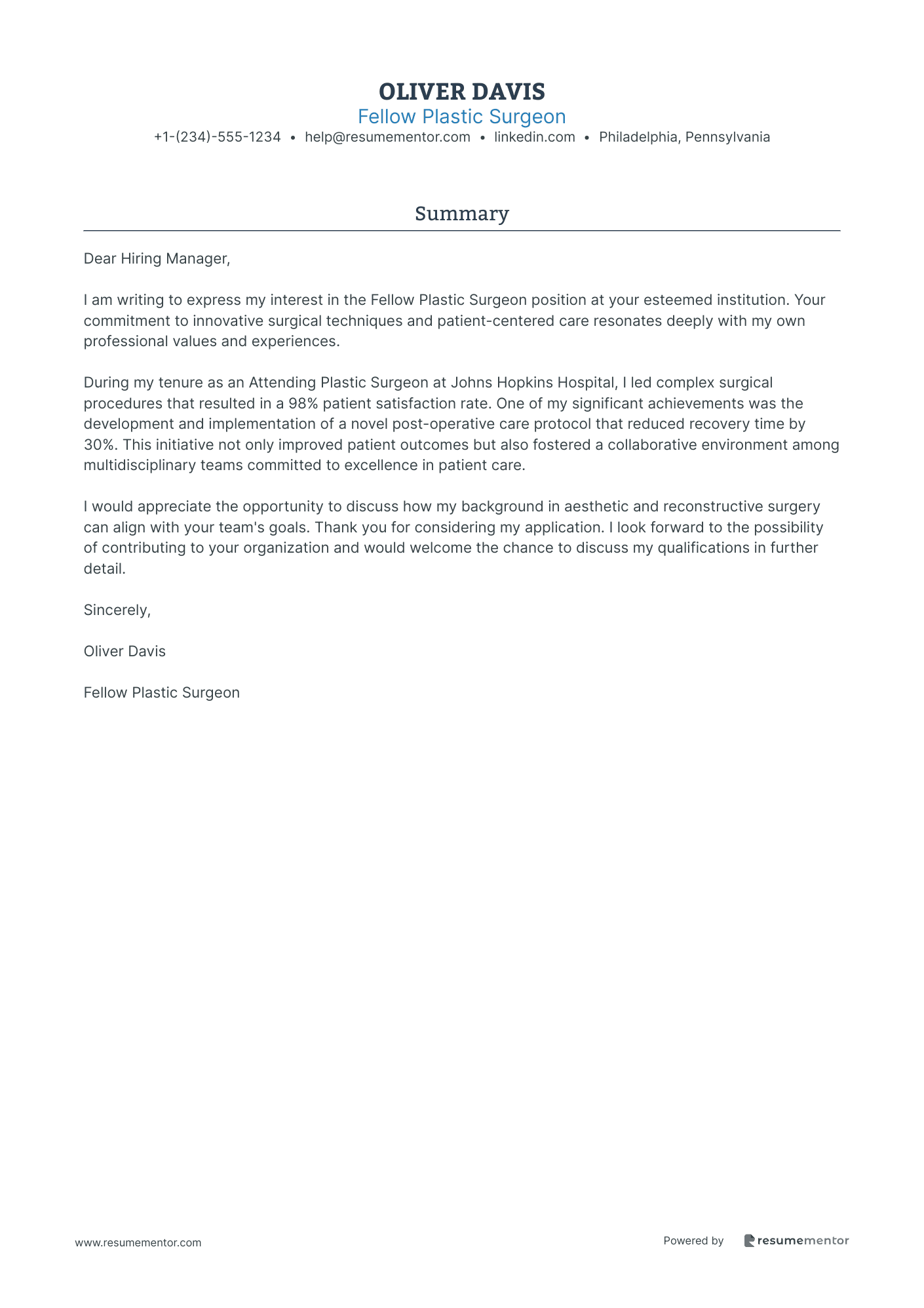
Fellow Plastic Surgeon
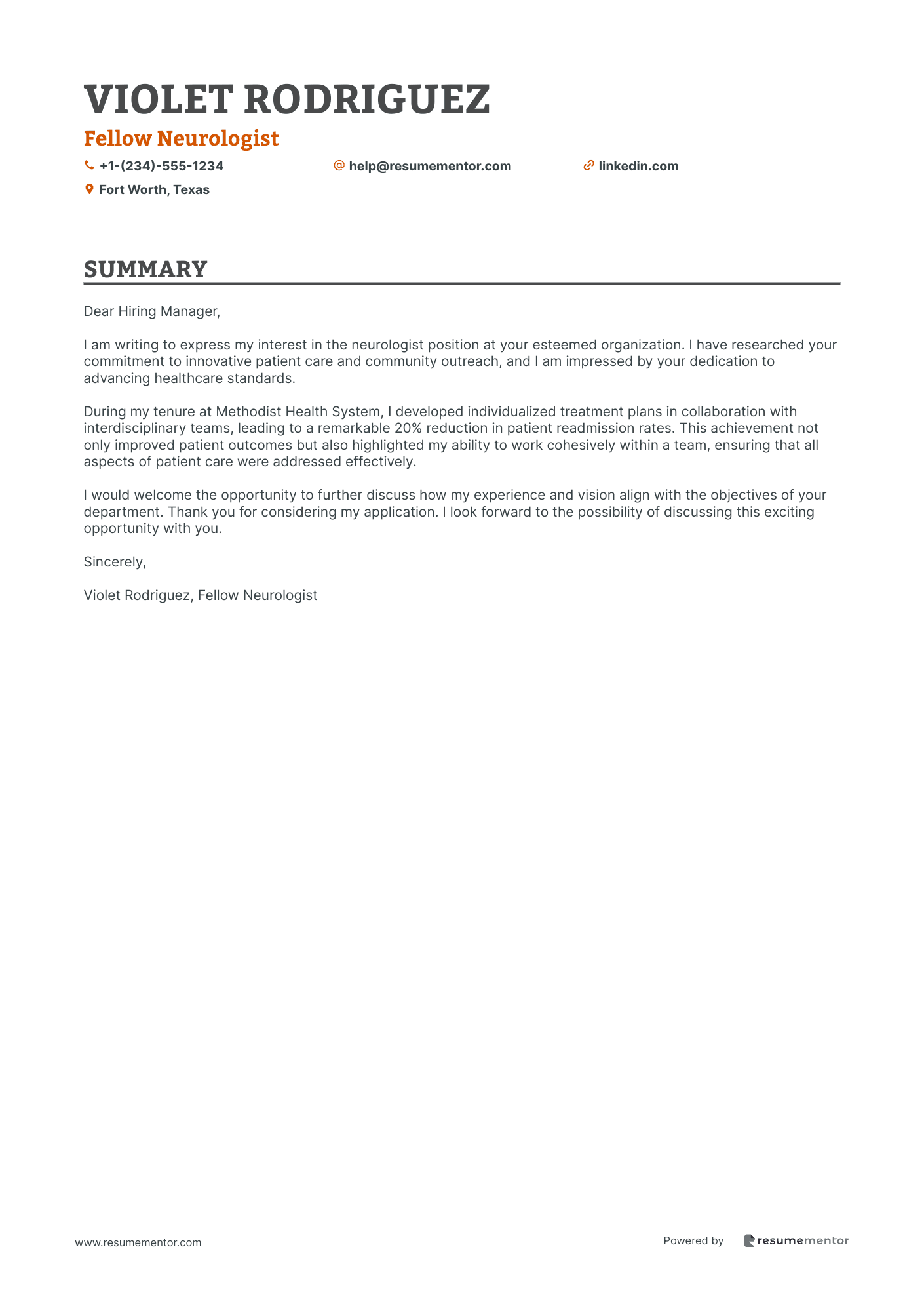
Fellow Neurologist
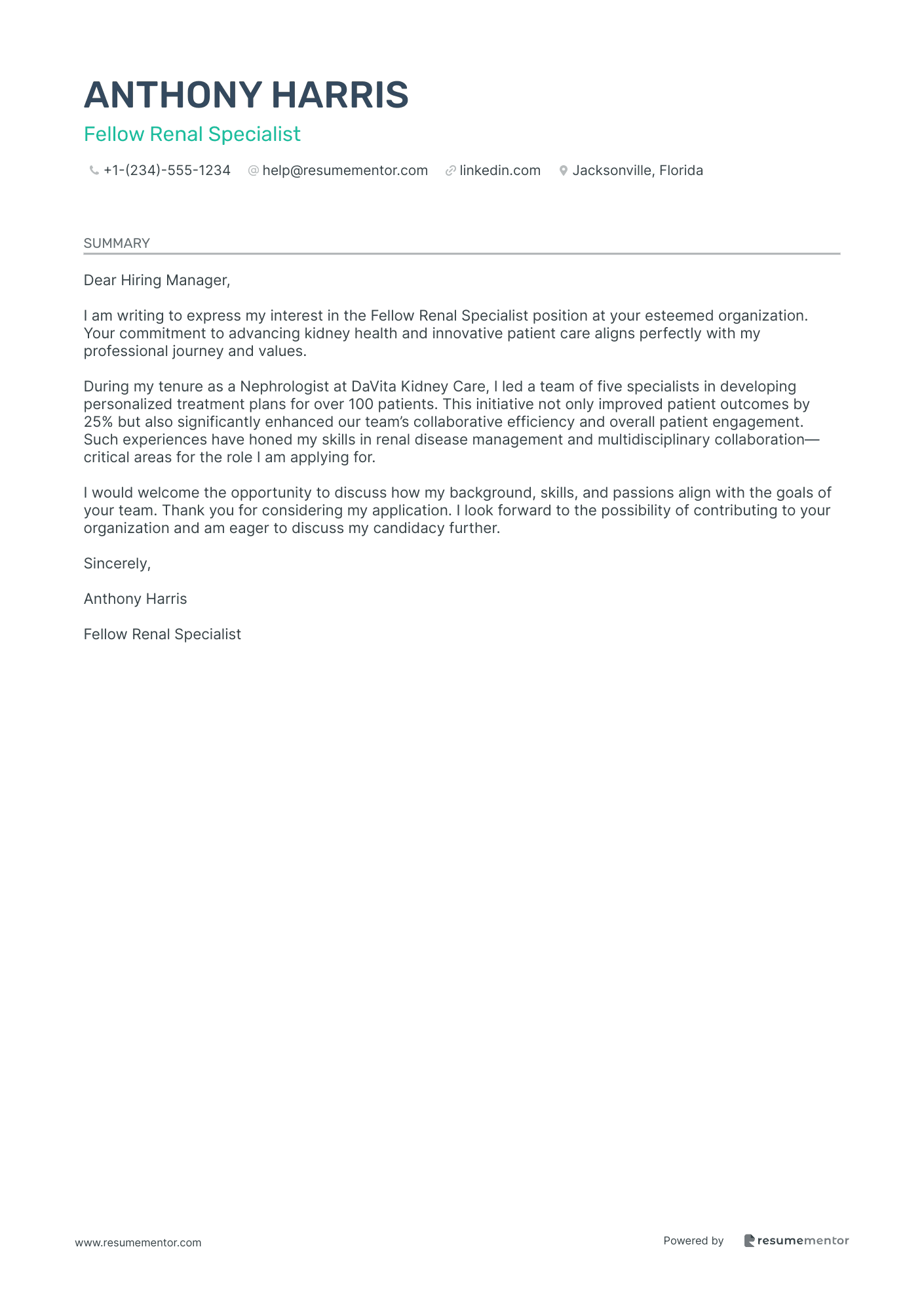
Fellow Renal Specialist
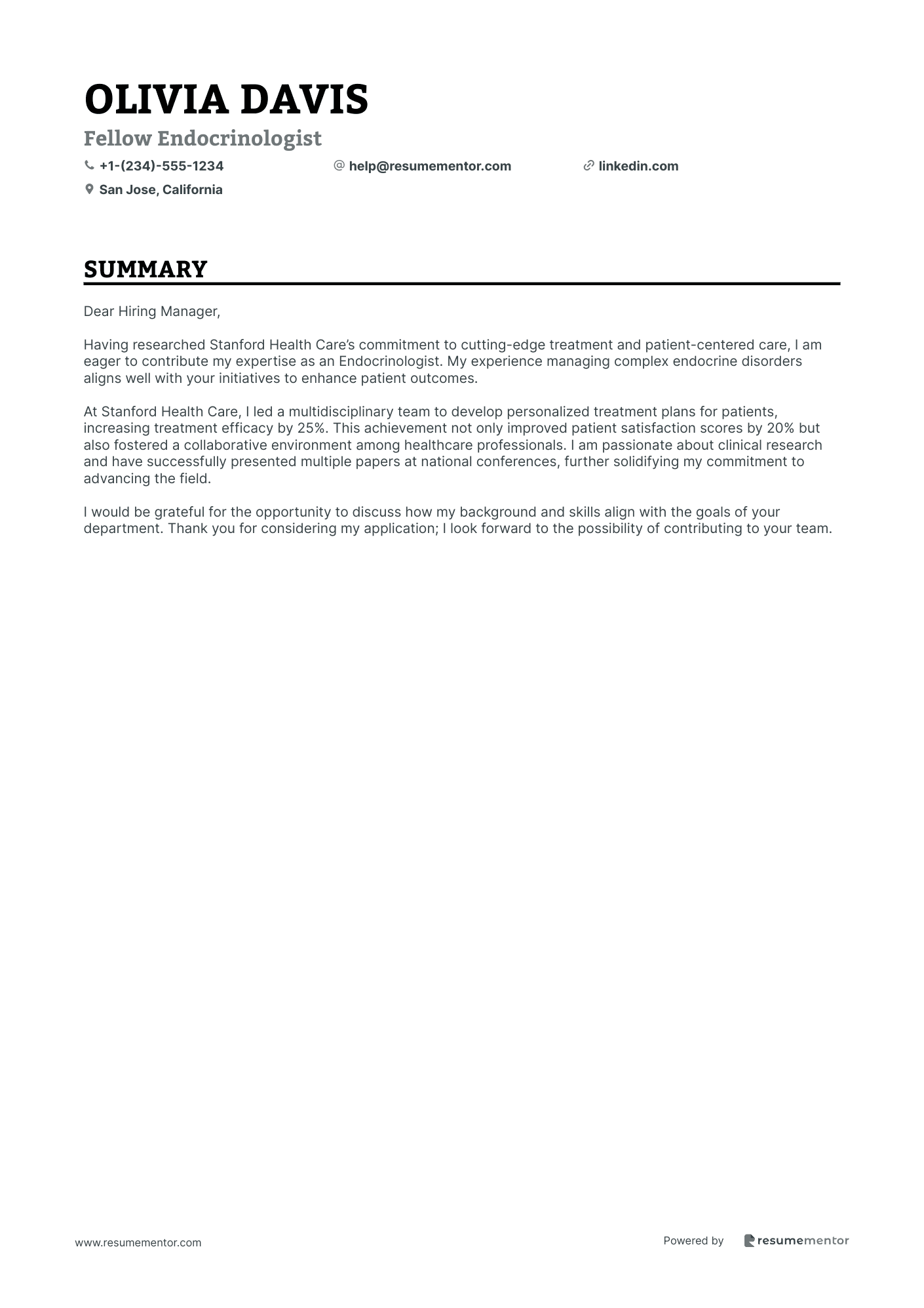
Fellow Endocrinologist
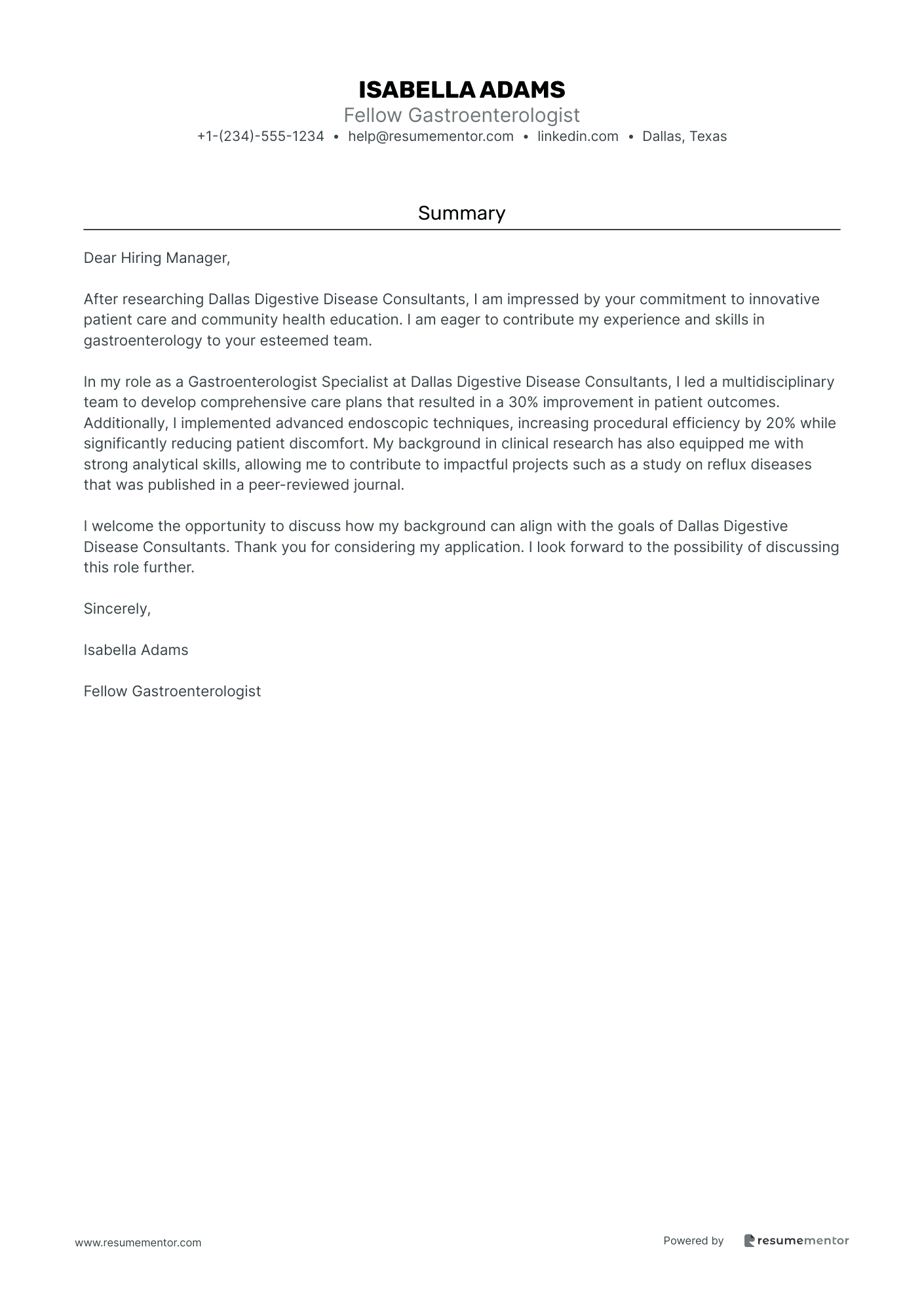
Fellow Gastroenterologist
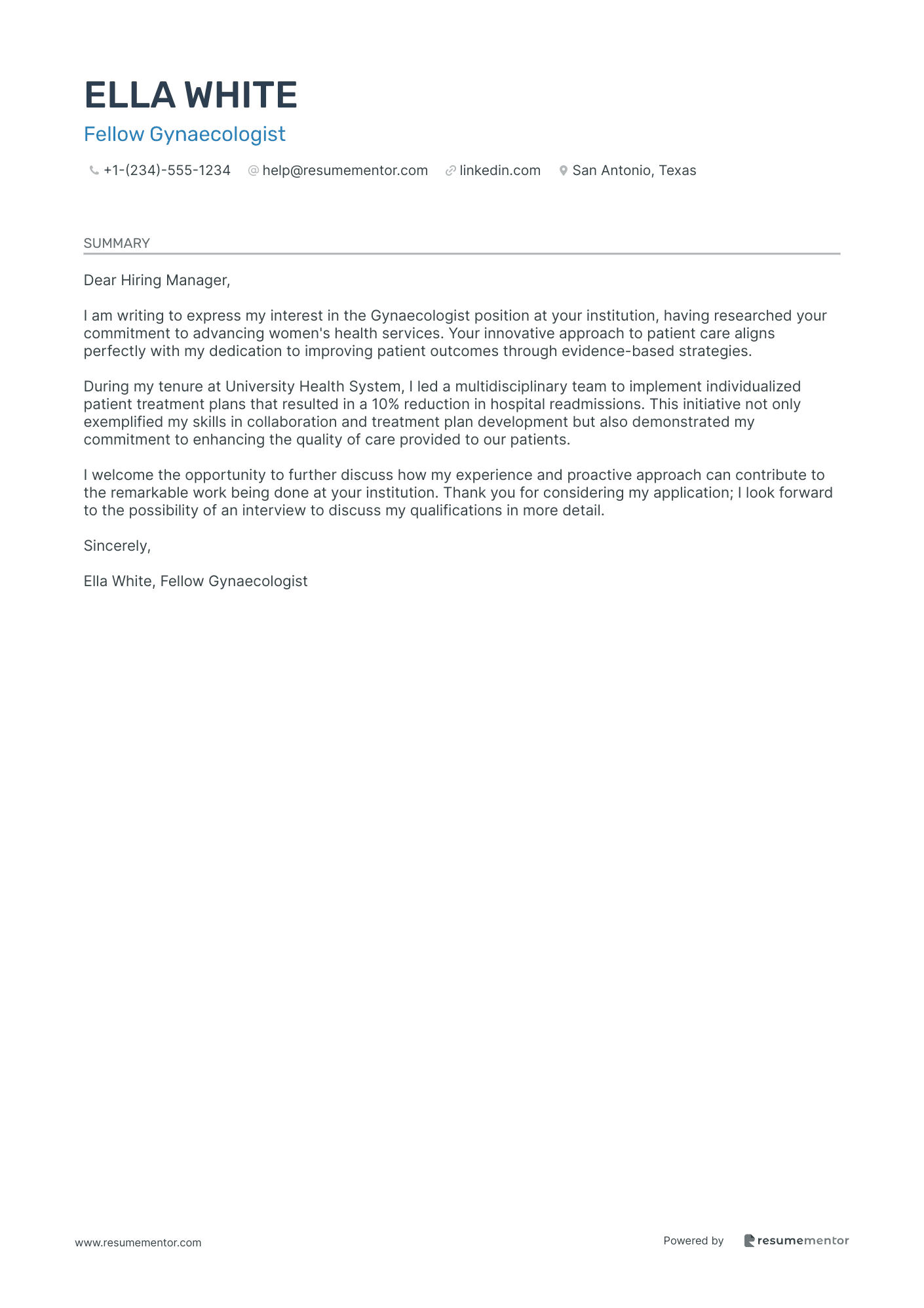
Fellow Gynaecologist

Fellow Pediatric Oncologist cover letter sample
In your cover letter, emphasize your clinical experience with pediatric patients, particularly those with cancer. Highlight any specialized training, such as certification in pediatric hematology-oncology, and include any research you’ve conducted in this field. Discuss your ability to collaborate effectively with multidisciplinary teams to develop treatment plans. Mention your commitment to patient and family education, showcasing how you've communicated complex medical concepts clearly. Provide examples of how your involvement improved patient outcomes or led to innovative treatment approaches.
Ella White
Fellow Pediatric Oncologist
Summary
Dear Hiring Manager,
I am writing to express my interest in the pediatric oncologist position at your esteemed facility. Having researched your commitment to advancing pediatric cancer care, I am drawn to your mission to cultivate innovative treatments and support for young patients and their families.
During my tenure at Nemours Children's Health, I led a transformative project that improved diagnostic accuracy by 25% through the introduction of advanced imaging techniques. This initiative not only enhanced patient outcomes but also allowed for more personalized treatment plans, ultimately achieving a 20% increase in survival rates among over 100 pediatric cancer patients. My collaborative approach, combined with my proficiency in clinical research and mentoring, contributed to a more integrated care model that consistently prioritized patient satisfaction.
I would appreciate the opportunity to further discuss how my background and skills align with the goals of your team. Thank you for considering my application; I look forward to the possibility of an interview to elaborate on my experiences and potential contributions.
Sincerely,
Ella White, Fellow Pediatric Oncologist
Fellow Cardiologist cover letter sample
In your cover letter, focus on your clinical experiences and any specialized training in cardiology. Highlight your proficiency in performing diagnostic tests like echocardiograms or stress tests. It's important to mention collaborative work with surgical teams and any hospital initiatives you contributed to, as teamwork is key in this field. Include specific case studies or patient outcomes that showcase your ability to diagnose and treat complex conditions. Use quantitative data to illustrate improvements in patient care or outcomes linked to your interventions.
Violet Rodriguez
Fellow Cardiologist
Summary
Dear Hiring Manager,
I am writing to express my interest in the cardiology position within your esteemed organization. My research into your commitment to patient care and innovative treatment solutions aligns perfectly with my professional values and objectives.
During my fellowship at the Cleveland Clinic, I developed and implemented evidence-based treatment plans that led to a significant 20% reduction in patient readmissions within a six-month period. This achievement not only demonstrates my ability to improve patient outcomes through meticulous treatment planning but also highlights my strong collaboration with multidisciplinary teams to enhance patient care.
I welcome the opportunity to discuss how my background, skills, and accomplishments can contribute to your team's success. Thank you for considering my application—I look forward to the possibility of further conversation.
Sincerely,
Violet Rodriguez, Fellow Cardiologist
Fellow Nephrology Specialist cover letter sample
When applying for this position, emphasize your clinical experience in nephrology, highlighting any hands-on procedures you've performed, such as dialysis or kidney biopsies. Stress your expertise in managing chronic kidney disease and hypertension, as well as any involvement in patient education programs. Mention relevant certifications, such as board certification or specialized training, to demonstrate your commitment. Use specific examples of how your care strategies have improved patient outcomes, following a clear 'skill-action-result' format to showcase your impact in previous roles.
Carter Rodriguez
Fellow Nephrology Specialist
Summary
Dear Hiring Manager,
I have been following the advancements at your institution and am impressed by your commitment to innovative nephrology care and research. I am eager to bring my extensive experience as a nephrology specialist to your team, particularly in light of your recent initiatives aimed at improving patient outcomes.
During my tenure as a Nephrology Resident at Johns Hopkins Hospital, I successfully managed a caseload of over 20 patients with chronic kidney disease, leading to a 15% improvement in recovery rates. This achievement was a direct result of my commitment to detailed patient management and enhanced interdisciplinary collaboration, which I understand aligns with your organization's focus on holistic patient care.
I look forward to the opportunity to discuss how my background and skills can contribute to your team and would appreciate the chance to further explore this position. Thank you for considering my application.
Fellow Neonatologist cover letter sample
In your cover letter, it's essential to highlight your experience in managing critically ill newborns. Detail your skills in delivering advanced neonatal care, as well as any specialized training in areas like respiratory support or neonatal resuscitation. Showcase your competency in collaborating with multidisciplinary teams and working with families, emphasizing effective communication. Include any research projects you've contributed to or presentations given at conferences, as these demonstrate your commitment to advancing the field. Illustrate how your clinical skills have improved patient outcomes, following the 'skill-action-result' format.
Summary
Dear Hiring Manager,
I am writing to express my interest in the Neonatologist position at your esteemed facility. After researching your commitment to innovative neonatal care and dedication to family-centered practices, I am eager to contribute my skills to your team.
In my recent role as a Neonatologist at Children's Health, I led a NICU project that significantly improved infant survival rates by 15%. This initiative not only required advanced therapeutic knowledge but also effective collaboration with multidisciplinary teams to implement new care protocols. The positive impact on patient outcomes reinforced my belief in the importance of continuous improvement and evidence-based practices in neonatal care.
I would welcome the opportunity to discuss how my background and accomplishments align with the goals of your team. Thank you for considering my application; I look forward to the possibility of contributing to your organization.
Sincerely,
Carter Rodriguez, Fellow Neonatologist
Fellow Plastic Surgeon cover letter sample
When crafting your cover letter, be sure to emphasize your surgical experience, especially in specific techniques like reconstructive or aesthetic procedures. Highlight any fellowships or advanced training relevant to your specialty, noting the duration and skills acquired. It's important to showcase your commitment to patient care, including before-and-after case studies that demonstrate successful outcomes. Additionally, mention any leadership roles in clinical settings, as well as your publications or presentations in professional forums, to illustrate your dedication to advancing the field.
Oliver Davis
Fellow Plastic Surgeon
Summary
Dear Hiring Manager,
I am writing to express my interest in the Fellow Plastic Surgeon position at your esteemed institution. Your commitment to innovative surgical techniques and patient-centered care resonates deeply with my own professional values and experiences.
During my tenure as an Attending Plastic Surgeon at Johns Hopkins Hospital, I led complex surgical procedures that resulted in a 98% patient satisfaction rate. One of my significant achievements was the development and implementation of a novel post-operative care protocol that reduced recovery time by 30%. This initiative not only improved patient outcomes but also fostered a collaborative environment among multidisciplinary teams committed to excellence in patient care.
I would appreciate the opportunity to discuss how my background in aesthetic and reconstructive surgery can align with your team's goals. Thank you for considering my application. I look forward to the possibility of contributing to your organization and would welcome the chance to discuss my qualifications in further detail.
Sincerely,
Oliver Davis
Fellow Plastic Surgeon
Fellow Neurologist cover letter sample
Highlight your clinical experience and any specialized training in neurological disorders. It’s important to showcase your diagnostic skills, particularly any difficult cases you have handled effectively. If you have published research or presented at conferences, mention these achievements to demonstrate your commitment to the field. Also, include any collaborative work with multidisciplinary teams, emphasizing the impact on patient care. Use specific examples that follow a 'skill-action-result' format to illustrate how your contributions have led to improved outcomes in previous roles.
Violet Rodriguez
Fellow Neurologist
Summary
Dear Hiring Manager,
I am writing to express my interest in the neurologist position at your esteemed organization. I have researched your commitment to innovative patient care and community outreach, and I am impressed by your dedication to advancing healthcare standards.
During my tenure at Methodist Health System, I developed individualized treatment plans in collaboration with interdisciplinary teams, leading to a remarkable 20% reduction in patient readmission rates. This achievement not only improved patient outcomes but also highlighted my ability to work cohesively within a team, ensuring that all aspects of patient care were addressed effectively.
I would welcome the opportunity to further discuss how my experience and vision align with the objectives of your department. Thank you for considering my application. I look forward to the possibility of discussing this exciting opportunity with you.
Sincerely,
Violet Rodriguez, Fellow Neurologist
Fellow Renal Specialist cover letter sample
When applying for this position, it's important to showcase your experience in nephrology and any specialized training. Highlight your clinical skills in managing dialysis patients and performing renal assessments. If you have certifications like 'Board Certified Nephrology' or related fellowships, include these to demonstrate your expertise. Discuss how you have improved patient outcomes through evidence-based practices, showing a clear 'skill-action-result' framework. Additionally, emphasize your teamwork abilities with interdisciplinary teams and any involvement in research or educational initiatives to illustrate your commitment to advancing the field.
Anthony Harris
Fellow Renal Specialist
Summary
Dear Hiring Manager,
I am writing to express my interest in the Fellow Renal Specialist position at your esteemed organization. Your commitment to advancing kidney health and innovative patient care aligns perfectly with my professional journey and values.
During my tenure as a Nephrologist at DaVita Kidney Care, I led a team of five specialists in developing personalized treatment plans for over 100 patients. This initiative not only improved patient outcomes by 25% but also significantly enhanced our team’s collaborative efficiency and overall patient engagement. Such experiences have honed my skills in renal disease management and multidisciplinary collaboration—critical areas for the role I am applying for.
I would welcome the opportunity to discuss how my background, skills, and passions align with the goals of your team. Thank you for considering my application. I look forward to the possibility of contributing to your organization and am eager to discuss my candidacy further.
Sincerely,
Anthony Harris
Fellow Renal Specialist
Fellow Endocrinologist cover letter sample
When preparing your cover letter, emphasize your clinical experience in endocrinology and any research contributions you've made. Highlight your familiarity with diabetes management, thyroid disorders, and hormonal imbalances. Include any specialized training or certifications, such as Board Certification in Endocrinology, to showcase your expertise. Offer examples that illustrate your ability to diagnose complex cases and implement effective treatment plans. Additionally, discuss how your collaborative skills have enhanced patient care within multidisciplinary teams, demonstrating a commitment to improving patient outcomes.
Olivia Davis
Fellow Endocrinologist
Summary
Dear Hiring Manager,
Having researched Stanford Health Care’s commitment to cutting-edge treatment and patient-centered care, I am eager to contribute my expertise as an Endocrinologist. My experience managing complex endocrine disorders aligns well with your initiatives to enhance patient outcomes.
At Stanford Health Care, I led a multidisciplinary team to develop personalized treatment plans for patients, increasing treatment efficacy by 25%. This achievement not only improved patient satisfaction scores by 20% but also fostered a collaborative environment among healthcare professionals. I am passionate about clinical research and have successfully presented multiple papers at national conferences, further solidifying my commitment to advancing the field.
I would be grateful for the opportunity to discuss how my background and skills align with the goals of your department. Thank you for considering my application; I look forward to the possibility of contributing to your team.
Fellow Gastroenterologist cover letter sample
When applying for this position, highlight any relevant clinical experience and specialized training in gastrointestinal disorders. Emphasize your proficiency in diagnostic procedures like endoscopy and colonoscopy. Mention any research you’ve conducted or publications you’ve authored in the field, as this demonstrates a commitment to advancing medical knowledge. Detail instances where your skills led to improved patient outcomes or enhanced team collaboration. Using a 'skill-action-result' format can strengthen your application, showing potential employers that you directly contributed to the success of past initiatives.
Isabella Adams
Fellow Gastroenterologist
Summary
Dear Hiring Manager,
After researching Dallas Digestive Disease Consultants, I am impressed by your commitment to innovative patient care and community health education. I am eager to contribute my experience and skills in gastroenterology to your esteemed team.
In my role as a Gastroenterologist Specialist at Dallas Digestive Disease Consultants, I led a multidisciplinary team to develop comprehensive care plans that resulted in a 30% improvement in patient outcomes. Additionally, I implemented advanced endoscopic techniques, increasing procedural efficiency by 20% while significantly reducing patient discomfort. My background in clinical research has also equipped me with strong analytical skills, allowing me to contribute to impactful projects such as a study on reflux diseases that was published in a peer-reviewed journal.
I welcome the opportunity to discuss how my background can align with the goals of Dallas Digestive Disease Consultants. Thank you for considering my application. I look forward to the possibility of discussing this role further.
Sincerely,
Isabella Adams
Fellow Gastroenterologist
Fellow Gynaecologist cover letter sample
When applying for this position, be sure to emphasize your experience in women's health and any specialization in reproductive medicine. Highlight your surgical skills and any minimally invasive techniques you are proficient in. It is beneficial to mention any research or publications in the field, showcasing your commitment to advancing gynecological practices. Include specific examples of how your patient care has led to improved health outcomes, using a 'skill-action-result' format. Strong teamwork and collaboration with other medical professionals are also crucial to emphasize.
Summary
Dear Hiring Manager,
I am writing to express my interest in the Gynaecologist position at your institution, having researched your commitment to advancing women's health services. Your innovative approach to patient care aligns perfectly with my dedication to improving patient outcomes through evidence-based strategies.
During my tenure at University Health System, I led a multidisciplinary team to implement individualized patient treatment plans that resulted in a 10% reduction in hospital readmissions. This initiative not only exemplified my skills in collaboration and treatment plan development but also demonstrated my commitment to enhancing the quality of care provided to our patients.
I welcome the opportunity to further discuss how my experience and proactive approach can contribute to the remarkable work being done at your institution. Thank you for considering my application; I look forward to the possibility of an interview to discuss my qualifications in more detail.
Sincerely,
Ella White, Fellow Gynaecologist
Related Articles

Continue Reading
Check more recommended readings to get the job of your dreams.
Resume
Resources
Tools
© 2026. All rights reserved.
Made with love by people who care.
